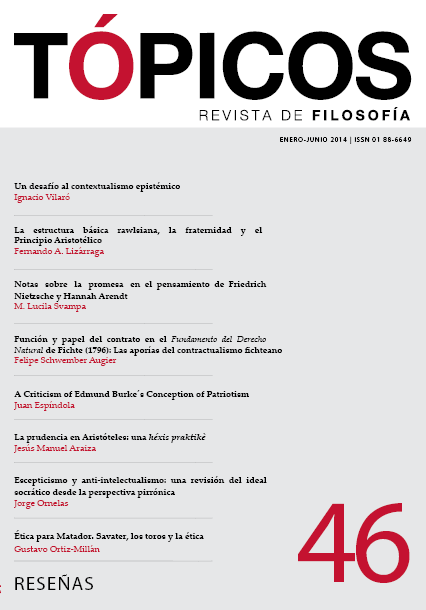Publicado 2014-06-27
Palabras clave
- Contextualismo Epistémico,
- Escepticismo,
- DeRose.
Cómo citar
Resumen
Una teoría de las oraciones de adscripción de conocimiento debe lidiar con el desafío escéptico cartesiano. El Contextualismo Epistémico ofrece una manera atractiva de hacerlo, lo que se considera una de sus virtudes principales. Pero, una vez que uno comienza a pedir más claridad sobre cómo se supone que funciona la estrategia, no tardan en aparecer los problemas. Recuerdo muy brevemente algunas versiones no promisorias del Contextualismo, ya reseñadas por Keith DeRose, y luego presento su propia versión del Contextualismo, diseñada para superar las dificultades de estas últimas. Ofrezco razones para pensar que, en último término, DeRose tampoco logra enfrentar satisfactoriamente dichos problemas. El simpatizante del Contextualismo nos debe una explicación de cómo se supone que debemos implementar su estrategia anti-escéptica.
Descargas
Referencias
- DeRose, Keith. 1999a. “How Can We Know that We’re Not Brains in Vats?,” Southern Journal of Philosophy 38:121-148.
- ––. 1999b. “Solving the Skeptical Problem,” en DeRose y Warfield (eds) Skepticism: a contemporary reader. New York: Oxford University Press
- ––. 1992. “Contextualism and Knowledge Attributions,” Philosophy and Phenomenological Research 52 (4):913-929.
- ––. 2010. “Insensitivity is back, baby!,” Philosophical Perspectives 24 (1).
- Engel, Mylan. 2004. “What´s Wrong with Contextualism, and a Noncontextualist Resolution of the Skeptical Paradox,” Erkenntnis Erkenntnis 61 (2-3):203-231.
- Feldman, Richard. 1999. “Contextualism and Skepticism,” Nous 33 (s13):91-114.
- Gettier, Edmund L. 1963. “Is Justified True Belief Knowledge?,” Analysis 23 (6):121-123.
- Nozick, Robert. 1981. Philosophical explanations. Cambridge, Mass.: Harvard University Press.
- Pritchard, D. 2005. “Neo-Mooreanism versus Contextualism,” Graxer Philosophische Studien 69:1-24.
- Schiffer, Stephen. 1996. “Contextualist Solutions to Scepticism,” Proceedings of the Aristotelian Society 96:317-333.
- Sosa, Ernest. 1999. “How to Defeat Opposition to Moore,” Nous 33 (s13):141-153.






